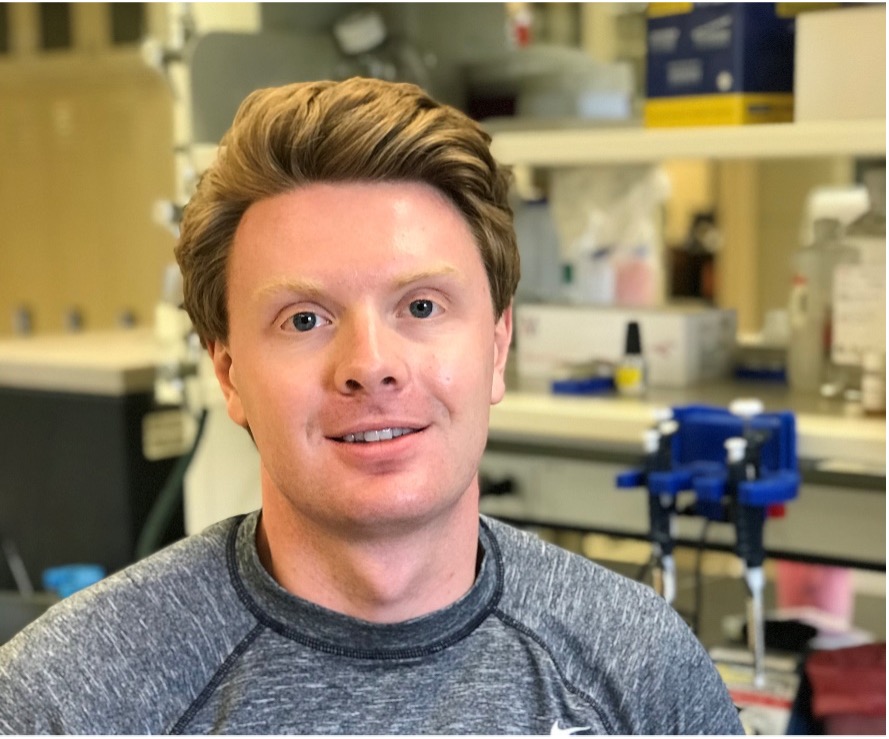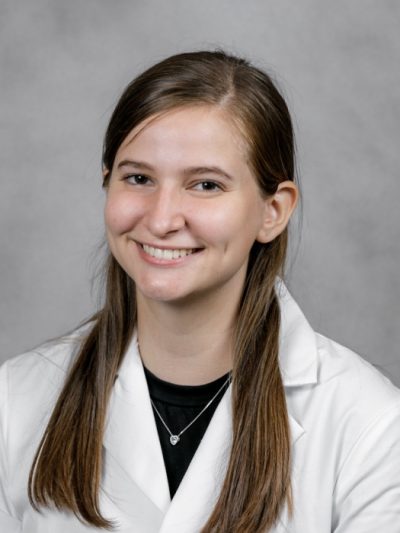2022 Dean’s Biomedical Sciences Scholar Awardees
Now in its second year, the UIC College of Medicine announced a new program to recognize exceptional research being conducted by graduate students working toward their PhD or MD/PhD degrees. Please join us in congratulating our Dean’s Scholars.
Jordan Jousma Heading link

Mentor: Sang-Ging Ong, Department of Pharmacology and Regenerative Medicine
My research investigates heart failure with preserved ejection fraction (HFpEF). This form of heart failure has rapidly ascended to the dominant form in the United States in recent years. This is partly due to the coincidental increase in comorbidities, such as obesity which is extremely prevalent amongst the HFpEF population. Recent clinical observations have shown that adiposity correlates with impairments in diastolic function, a hallmark feature of HFpEF. To directly investigate the role of adipose-heart crosstalk, I, therefore, made use of a pharmacological agent to manipulate adipose tissue function and evaluated the effects on cardiac function. Using echocardiography, I determined that treatment with a β3-adrenergic agonist served a cardioprotective role against the development of diastolic dysfunction. Biochemical and histological analysis of cardiac and adipose tissues supported the notion that the cardioprotective effects were owed to the drug acting on adipose tissue. This was confirmed with a series of transplantation experiments involving β3-AR agonist-treated donor adipose tissues into untreated mice, whereafter cardioprotective effects were still observed. Finally, a genetic mode that increased the amount of thermogenic adipose tissues was also used to demonstrate the cardioprotective role this adipose tissue’s functional state can have in HFpEF. In summary, my experiments have shown that adipose tissue dysfunction contributes to diastolic dysfunction and that targeting this tissue can be an efficacious strategy for developing new cardiovascular therapies for HFpEF treatments.
My mentor is Sang-Ging Ong, who is part of the Department of Pharmacology and Regenerative Medicine. It would be a disservice for me to try to say all the positive things I wish I could say about Dr. Ong in just a sentence or two. Having a good mentor is an important part of your development as a scientist though I feel incredibly fortunate to have someone like Dr. Ong guiding me along this path.
Gauri Kulkarni Heading link

Mentor: Christian Peters, Department of Anatomy and Cell Biology
My research investigates heart failure with preserved ejection fraction (HFpEF). This form of heart failure has rapidly ascended to the dominant form in the United States in recent years. This is partly due to the coincidental increase in comorbidities, such as obesity which is extremely prevalent amongst the HFpEF population. Recent clinical observations have shown that adiposity correlates with impairments in diastolic function, a hallmark feature of HFpEF. To directly investigate the role of adipose-heart crosstalk, I, therefore, made use of a pharmacological agent to manipulate adipose tissue function and evaluated the effects on cardiac function. Using echocardiography, I determined that treatment with a β3-adrenergic agonist served a cardioprotective role against the development of diastolic dysfunction. Biochemical and histological analysis of cardiac and adipose tissues supported the notion that the cardioprotective effects were owed to the drug acting on adipose tissue. This was confirmed with a series of transplantation experiments involving β3-AR agonist-treated donor adipose tissues into untreated mice, whereafter cardioprotective effects were still observed. Finally, a genetic mode that increased the amount of thermogenic adipose tissues was also used to demonstrate the cardioprotective role this adipose tissue’s functional state can have in HFpEF. In summary, my experiments have shown that adipose tissue dysfunction contributes to diastolic dysfunction and that targeting this tissue can be an efficacious strategy for developing new cardiovascular therapies for HFpEF treatments.
My mentor is Sang-Ging Ong, who is part of the Department of Pharmacology and Regenerative Medicine. It would be a disservice for me to try to say all the positive things I wish I could say about Dr. Ong in just a sentence or two. Having a good mentor is an important part of your development as a scientist though I feel incredibly fortunate to have someone like Dr. Ong guiding me along this path.
Jessica McAleer Heading link

Mentor: Olusola Ajilore, Department of Psychiatry
Theta synchrony has emerged as a potential neural biomarker for internalizing psychopathologies, including depression and anxiety disorders, and may play a role in the emotion dysregulation common to individuals with these psychopathologies. Transcranial alternating current stimulation (tACS) is an emerging neuromodulatory technique that can specifically target and alter theta band activity and disrupt theta synchrony. My current work in the CoNeCT lab under my mentor Dr. Ajilore suggests that administering tACS out of phase within the theta band (offset theta-tACS) can modulate emotion regulation capability and yield improvements in participants’ feelings of anxiety and depression. The interruption of theta via tACS is meant to lower baseline levels of synchrony, thus allowing individuals to more flexibly synchronize and desynchronize within the frequency band as needed, instead of being less adaptive in response to cognitive demand. I hypothesize that repeated sessions of verum (active) stimulation will increasingly disrupt baseline theta synchrony, allowing a greater percentage of change in synchronization during emotion regulation, thus improving emotion regulation capacity and yielding subsequent improvement in clinical metrics of depression and anxiety. Further, though sham stimulation is often utilized as a placebo in neuromodulation studies, my research indicates that sham stimulation may in fact have a blunting effect on the stimulated frequency, which requires more evaluation and careful consideration. The overarching goal of my research is to better understand the effect of offset theta-tACS, both verum and sham, on emotion regulation and clinical metrics within individuals with internalizing psychopathologies.
Michelle Sheena Heading link

Mentor: Olusola Ajilore & Katie Burkhouse, Department of Psychiatry
Major depressive disorder (MDD) is a significant public health concern and offspring of mothers with a history of depression are more likely to develop depression earlier in life and have a more chronic and severe course of MDD. For my research, I am working with Dr. Katie Burkhouse with the Families, Affective Neuroscience, and Mood Disorders Lab, and Dr. Olusola Ajilore with the Computational Neuroscience and Connected Technologies Lab to apply novel approaches to electroencephalogram (EEG) analyses in multiple domains (time-domain, frequency-domain). Using this approach, I aim to examine blunted neural reward response as a familial risk marker of depression in early childhood. By examining this marker in a kindergarten-aged sample, findings have the potential to pinpoint neural risk markers implicated in the intergenerational transmission of MDD during early childhood for at-risk youth.
Amanda Snead Heading link

Mentor: Swetha Gowrishankar, Department of Anatomy and Cell Biology
I am an MSTP student working in the Gowrishankar lab, which focuses on lysosomal dysfunction in neurodegenerative diseases. Important to my work, dysfunction in the autophagic and lysosomal pathway (ALP) has been linked to various stages of Alzheimer’s disease (AD). This includes the robust accumulation of autophagic and lysosomal intermediates in swollen/dystrophic axons around amyloid plaques, observed in human AD brain and mouse models of the disease. My dissertation project will investigate how the autophagy lysosomal pathway is changed in two models of AD. I will use induced human pluripotent stem cells (iPSCs) to model human neurons carrying familial AD mutations and those showing buildup of lysosomes in axonal swellings, similar to those seen in post-mortem AD brains. I will then test whether increasing autophagic flux using a novel compound developed in the Aldrich Lab resolves AD pathology in our models. We hypothesize that inducing autophagy in neurons will restore autophagic and lysosomal homeostasis, exhibit neuro-protective effects, and will ameliorate AD pathology.
Margaret Weiss (Schulz) Heading link

Mentor:Maria Argos, Department of Epidemiology and Biostatistics & Rob Sargis, Department of Endocrinology
Under the co-mentorship of Dr. Maria Argos, Associate Professor – Division of Epidemiology and Biostatistics, and Dr. Rob Sargis, Associate Professor – Division of Endocrinology, Maggie is pursuing her MD/PhD in Epidemiology with a project focused on the impact of metal exposures on cardiometabolic disease trajectory among high-risk minority populations. Cardiometabolic diseases (CMDs) including diabetes, obesity, and hypertension, are chronic, multifactorial conditions in which metals are implicated as potential risk factors. CMDs are more prevalent in Hispanic/Latino populations yet Hispanic Americans remain understudied with respect to the impact of metals and environmental toxins on chronic disease development. Maggie’s dissertation project will investigate the associations between individual metal exposures and their mixture on CMD trajectories among a well-established, prospective cohort of Mexican Americans from Southern Texas. She will evaluate the longitudinal cardiovascular and metabolic outcomes of blood pressure, hemoglobin A1c, fasting plasma glucose, and homeostatic measures of assessment with individual metal exposures and metal mixtures among 600 individuals observed over 3 years. Given the substantial individual and societal burden of CMDs, it is vital to identify modifiable risk factors to empower action for disease prevention, detection, and treatment, especially among high-risk groups. This project will be advised under the complementary mentorship of Maggie’s co-mentors. Dr. Argos is a well-established environmental and molecular epidemiologist whose research focuses on understanding the etiology of chronic diseases across the life course. Dr. Sargis is a physician-scientist and endocrinologist whose research focuses on understanding the mechanisms of endocrine disrupting chemicals on the disruption of metabolic homeostasis.